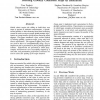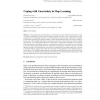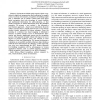150 search results - page 23 / 30 » Bayesian Landmark Learning for Mobile Robot Localization |
105
click to vote
EUROS
2008
15 years 4 months ago
2008
This paper addresses the measurement of motion expressiveness in wheeled mobile robots. A neural network based supervised learning strategy is proposed as a method to fuse informat...
108
click to vote
ICRA
2000
IEEE
15 years 7 months ago
2000
IEEE
Mobile robots require the ability to build their own maps to operate in unknown environments. A fundamental problem is that odometry-based dead reckoning cannot be used to assign ...
120
click to vote
IJCAI
1989
15 years 3 months ago
1989
In many applications in mobile robotics, it is important for a robot to explore its environment in order to construct a representation of space useful for guiding movement. We refe...
143
click to vote
ICRA
2005
IEEE
15 years 8 months ago
2005
IEEE
Abstract— Autonomous mobile agents require object recognition for high level interpretation and localization in complex scenes. In urban environments, recognition of buildings mi...
135
click to vote
PAMI
2007
15 years 2 months ago
2007
—We present a real-time algorithm which can recover the 3D trajectory of a monocular camera, moving rapidly through a previously unknown scene. Our system, which we dub MonoSLAM,...



